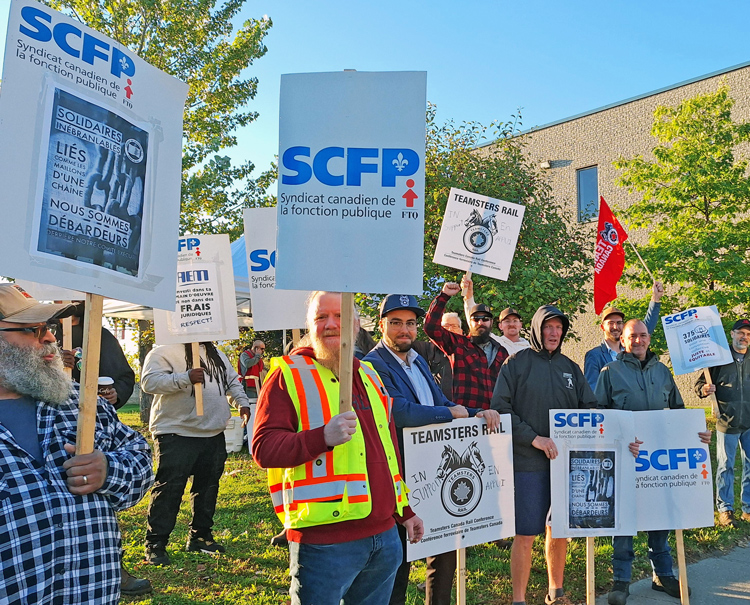MONTREAL — Port workers, members of Canadian Union of Public Employees Local 375, began a three-day strike here Sept. 30. Union members rejected the employers’ last offer by over 99%, and voted 98% to authorize a strike.
Of the 1,197 union members at Canada’s second-largest port, over 300 are on strike at two terminals run by Termont, which handles 41% of container traffic.
As soon as picket signs went up, union members were greeted with solidarity from passing truckers and other drivers honking their horns.
Improved scheduling is a central demand. Port workers must call in every afternoon to find out if or when they are working the next day, and where. They’re required to be available 19 days out of 21. Union members point out that with both women and men working outside the home nowadays, this makes family, social and personal life unmanageable.
In preparation for the conflict, bosses have been rerouting maritime traffic to Halifax for months and reducing work hours for many Montreal port workers.
At the terminal entrance next to the union office, four Teamsters union members, who work at Canadian National Railway, joined the line with union signs of solidarity. In late August, after some 10,000 freight rail workers across Canada had been on strike or locked out for three days, Ottawa ordered them back to work, citing harm to the “economy.” Rail workers were denied the right to strike and are subject to compulsory arbitration on a new contract.
Many workers told the Militant they were angry about government attacks and welcomed the rail workers warmly. Two Confederation of National Trade Unions members locked out since June by glass manufacturer Prelco here joined the line. Union member Michelle Pelletier told the Militant, “We’re all together, no matter what color your flag, that’s not important. We held their signs for them.”
Dockworkers back rail workers
On Aug. 29, port workers union presidents from Vancouver, Montreal and Halifax came together in an unprecedented press conference in Montreal to back rail workers’ right to strike at Canada’s two main railroads, Canadian National and Canadian Pacific Kansas City.
“The government has reduced the right to strike for all federal workers to subzero,” Montreal CUPE spokesman Michel Murray said. “The reasons given for government action were purely economic. Yet what is a strike for, other than to put economic pressure on the employer? Port workers across Canada will not allow the right to strike to be put in the shredder.”
Following a five-day walkout in 2021, Ottawa declared the Montreal port workers “essential,” ordering them back to work under compulsory arbitration. Since then, nothing has been resolved.
“The Canadian supply chain is already fragile,” said the Maritime Employers Association in a thinly veiled call on Ottawa for new strikebreaking action. “The uncertainty caused by this long delay and the recurrence of labor disputes are affecting the Quebec and Canadian economies, and Canada’s reputation as a reliable and resilient trading partner.”
“Like the port workers, we walked the picket line for safety on the job and against fatigue,” Philippe Tessier, one of the four members of the Teamsters solidarity delegation on the picket line, told the Militant Sept. 30. He is also the Communist League candidate in the Quebec National Assembly by-election in the Terrebonne riding near Montreal.
“When the port bosses and their government cry about fragile supply chains and the Canadian economy they want to boost their profits at the cost of our lives,” he said. “The labor movement as a whole and all working people need to mobilize solidarity with the Montreal port workers and defend our right to use our unions to bargain and to strike.”


